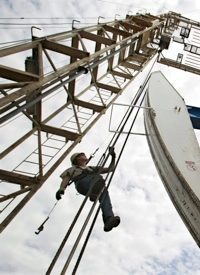
The continuing boom in North Dakota seemingly has no end. Last June oil production from the Bakken Formation exceeded 11 million barrels a month. In February it reached 16 million with estimates that by late spring North Dakota could be producing more oil than either California or Alaska. That’s more than double what the state produced just two years ago.
The population boom in Williston and elsewhere continues to set records. The oil industry employs more than 30,000 people and could exceed 100,000 if production rises as expected to a million barrels a day. There are so many job openings that the state is sponsoring trade fairs across the country and has to deal with — are you ready? — budget surpluses!
Comparisons between North Dakota and other states struggling with deficits and high unemployment abound. Steve Moore wrote about it in the Wall Street Journal, noting that North Dakota has a budget surplus of $1 billion out of a $3.5 billion budget and it has already cut income taxes and is considering further reductions. Complete funding for the state’s pension plan is accomplished every year and the state is building “infrastructure” projects: roads, bridges, railroads and pipelines.
Moore compares this to the issues facing California: five straight years of budget deficits with the current fiscal year’s shortfall expected to exceed $6 billion. Brian Calle wrote in California’s City Journal:
How did North Dakota pull it off? Oil production has driven the recent boom. Drilling restrictions in Alaska, the Gulf of Mexico, and even Canada have given North Dakota an opportunity to expand its oil industry substantially. North Dakota now accounts for 6 percent of U.S. domestic oil production and already ranks fourth in the nation behind Texas, Alaska, and, yes, California…
The state imposes no energy-efficiency resource standard for electricity or natural gas, and it has no mandatory statewide residential or commercial energy code. North Dakota lawmakers have let market demand dictate coal and oil production… [Emphasis added.]
While California is rich in both conventional and renewable energy, gridlock in the state legislature has hampered development of these resources. Unlike North Dakota’s officials, who welcome the economic growth and new revenues, California lawmakers seem intent on reducing the state’s role in domestic oil production [Emphasis in original.]. Legislators have imposed laws much stricter than federal standards and worked aggressively to subsidize alternative energy sources and mandate their use. California’s Global Warming Solutions Act of 2006 and subsequent legislation—requiring that the state obtain at least one-third of its energy from renewable sources such as wind, solar, and geothermal—will impose onerous costs not only on businesses, but on every ratepayer and consumer in the state. Estimates vary, but at least one study projected that the law would cost the state economy $183 billion—a staggering burden for Californians already struggling under the highest energy prices in the nation.
North Dakota has deliberately let the free market operate — which has resulted not only in the virtual explosion in the oil fields but numerous side effects as well. Servers at the local Taco Bell in Williston make $15 an hour and more, waiters earn upwards of $25 an hour, and truckers can make $80-100,000 a year with overtime.
Nathan Pittman considered retiring from his trucking company in Indiana when he heard about what was happening in the Peace Garden State. Within weeks of moving to Watford, North Dakota, his income doubled to $2,225 a week. He now shows others how to set up shop there. He says: “There’s not a business you can start in North Dakota right now that wouldn’t make it.”
Despite their dubious societal benefit, even so-called exotic dance clubs are doing well. The Williston club Whispers receives applications from “exotic” dancers in Hawaii, Alaska, the Czech Republic and Germany, according to co-owner Melissa Slapnicka:
We used to have to beg people to come, and now we have to turn them away because we don’t have room for all the people who want to dance. My best girls would rather dance here than in Vegas, because they make more money here.
How much money? Kit, one of Slapnicka’s employees, said, “We make more than doctors. Back in the day, it was hard to make $200 a night. It was like pulling teeth. Now you can pull in $2,000 a night.”
The rough and tumble hurly-burly of the free market will allow amazing things to happen. The statist mentality that holds instead that free markets must be reined in is the difference between California and North Dakota. If statists would just step aside, the free market would prove once again that “there aren’t very many problems that sufficient freedom couldn’t solve.”
Photo: In this July 26, 2011 photo, Ben Shaw hangs from an oil derrick outside Williston, N.D.



